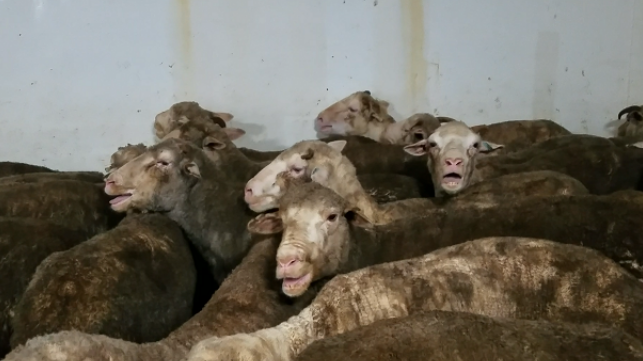 |
| Panting sheep Credit: Animals Australia |
Animals Australia has appeared in the first hearing of an unprecedented application in the Federal Court of Australia to challenge the legality of a live sheep export permit.
The challenge relates to an Emanuel Exports shipment of 58,000 sheep that departed Fremantle for the Middle East last week on the live export vessel, the Al Messilah. The month of June is the official start of the Middle East summer where the risks of sheep suffering and dying on vessels from heat stress during the northern-hemisphere summer have been a source of public debate after whistleblower footage was aired which showed images on board an August 2017 voyage of the Awassi Express for Emanuel Exports when 2,400 sheep died of heat stress.
The voyage became the centerpiece of an investigative media report on the 60 Minutes program, aired on April 8. Throughout the program, whistleblower footage from five separate voyages was aired depicting thousands of sheep suffering severe heat stress; sheep caked in melted feces and urine; injured and sick animals left to die slowly; decomposed bodies left in pens with living sheep and pregnant ewes giving birth and their lambs dying.
"We believe the granting of this export permit by the Department of Agriculture was unlawful, and we will be seeking an urgent Federal Court declaration to this effect," said Legal Counsel for Animals Australia, Shatha Hamade.
Under Australian law, an export permit for livestock may only be granted if certain conditions are met. These conditions include that the Secretary for the Department of Agriculture, or his delegate, be satisfied that the health, welfare and physical needs of the sheep will be met and maintained on an export voyage; and that the travel arrangements for the livestock will be adequate for their health and welfare.
"This export permit was granted despite animal health and welfare experts, including the Australian Veterinary Association, recommending sheep shipments to the Middle East during the summer period should not continue, due to the foreseeable and unavoidable welfare repercussions. Animals Australia's position is that, in light of the conditions required to be met, it is impossible to understand how any decision-maker acting reasonably could have arrived at the decision to approve this export permit.
"The extensive science and data from the past two decades of shipping sheep during the extreme heat and humidity of a northern summer speak to the inevitable distress and suffering that these animals will endure."
A key recommendation from a recent government review, the McCarthy Review, was that the heat stress risk assessment model be changed from one that is mortality based to one that is animal welfare based. This has not been implemented, and export permits continue to be granted.
The RSPCA has applauded the legal action, saying it will bring much-needed independent scrutiny of the federal Department of Agriculture’s process for granting live sheep export permits.
At a Senate Estimates hearings last month, a senior Department of Agriculture and Water Resources officer confirmed that reduced stocking densities that would result from the McCarthy Review recommendation would effectively “lead to the closure of the trade in the summer months.”









No comments:
Post a Comment